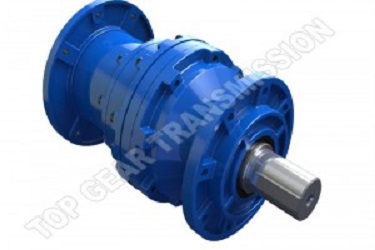BENEFITS OF PLANETARY GEARBOX

High power density –Power density is the amount of power (time rate of energy transfer) per unit volume. In case of planetary gears the load is shared by several planets instead of single gear like in other types of gearing, More the planets more the sharing of load and more the power density. As a result of which planetary gear box provide high power density in comparison to standard parallel axis gearboxes. Reduction due to high volume of planet gears, Multiple kinematic combinations, Purely torsional reactions, and coaxial shafting are the main parameters for high power density of planetary gears.
Compact Size: Due to high power density and coaxial shaft arrangement, the planetary gearboxes are more compact. In case of planetary gear system, driving member and driven member are concentric and therefore driving and driven equipment could be installed in same line which will result space saving. More on use of multiple planet gears helps to achieve high gear ratios in small space. Due to this planetary gearboxes are more suitable to the applications which demand high speed reduction in compact space.
Light Weight: High power density and compact size results into very light weight, due to which for same gear ratio or torque the planetary gearbox is more lighter as compared to other traditional (parallel shaft) kind of gearbox.
High Efficiency: Less power losses (upto 3% each stage) results in to high efficiency of planetary gearboxes. The gearing arrangement of planetary gears tends to transfer maximum of input energy to desired output, due to which efficiency as high as up to 97% can be achieved for first stage of planetary gearbox.
Higher Gear reduction(in small space): In planetary gearbox the drive through prime mover is given to the sun. The sun gear then drives the planetary gears assembled within the external ring gear which is fixed. The whole set of planetary gears revolves along its own axis and along the ring gear where the output shaft is connected to the planetary carrier. Therefore by increasing the number of planet gears operating within the same ring gear very high reduction ratios can be achieved within small space.
High Torque Transmitting Capacity: As the load in a planetary gear box is shared among multiple planets; therefore, torque transmitting capacity of planetary gearbox is very high. The torque transmission capacity can be further increased substantially by increasing the number of planet gears.
Highly Stable: The planetary gear box is highly stable due to an even distribution of mass and increased rotational stiffness. Torque applied radially onto the gears of a planetary gear box is transferred radially by the gear, without lateral pressure on the gear teeth.
Longer Life: The method of motion of a planetary gear box is different from traditional parallel gearbox. Traditional gears rely on a small number of contact points between two gears to transfer the driving force. In this case, all the loading is concentrated on a few contacting surfaces, making the gears wear quickly and sometimes crack. But the planetary gears has multiple gear contacting surfaces with a larger area that can distribute the loading evenly around the central axis. Multiple gear surfaces share the load, including any instantaneous impact loading, evenly, which make them more resistant to damage from higher torque. Upon applying a torque, equal distribution of torque takes place between the sun pinion and its planets. With the absence of any pinion bearings the pinion is free to float and with the applied load immediately centers itself on the pitch circle resulting in equal load sharing among the planets. To assure the load is further equally transmitted to the annulus or ring gear the planet carrier is stiff in design and structure thereby minimizing elastic deflections through the planet bearing pins. Spur gear teeth produce no axial force on the geared elements. In this way planetary gearbox has longer gear life as compared to traditional gearbox for similar loads.



Comments
Post a Comment